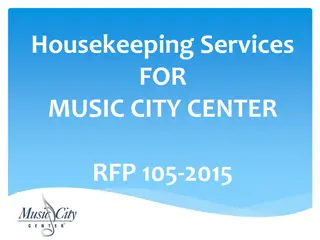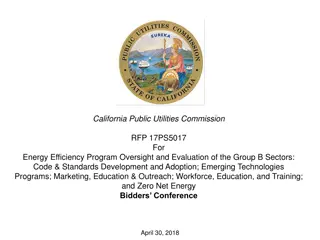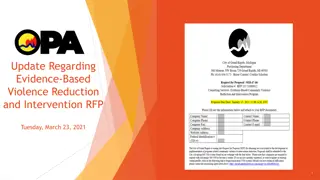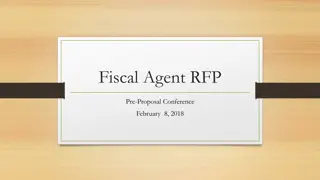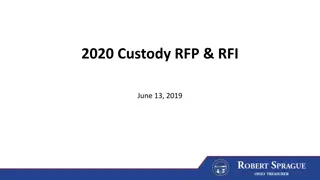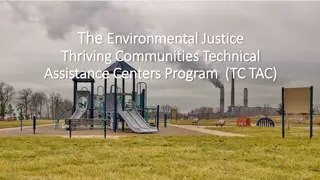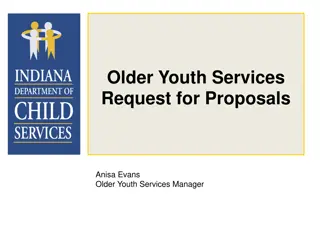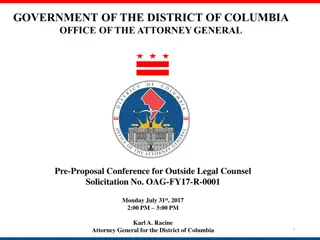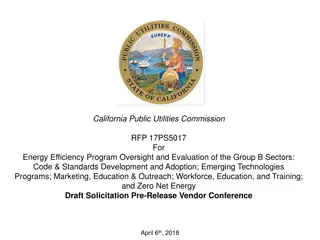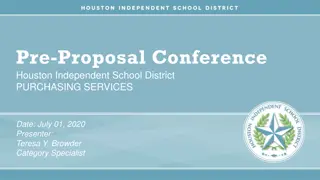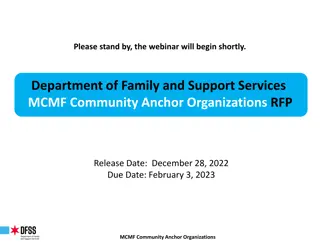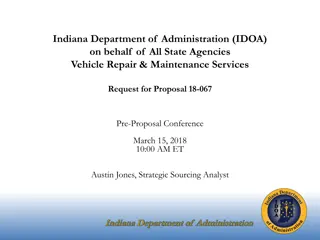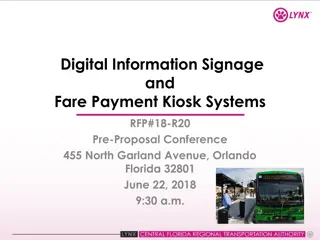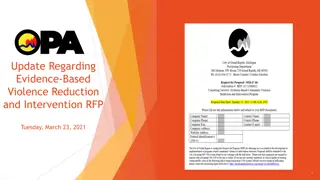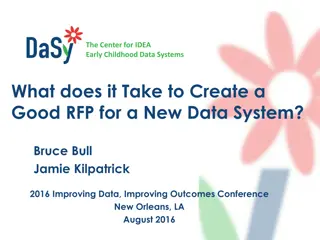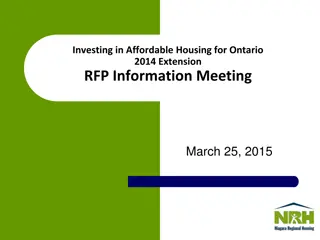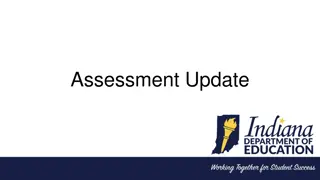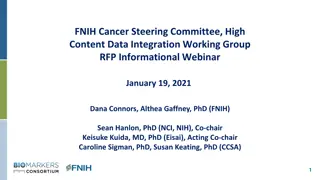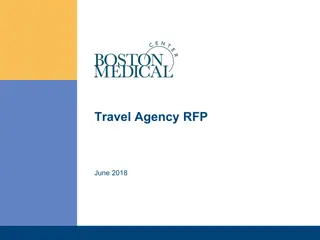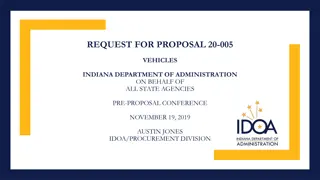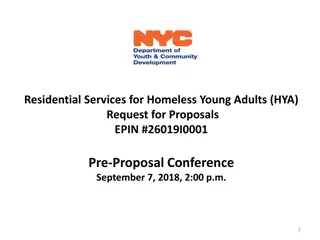
Sustainable Community-Driven Solutions for Equity in San Francisco
The Dream Keeper Initiative seeks to address systemic inequities by funding community-driven projects that expand access to services, promote cultural preservation, and enhance equity in various areas. The San Francisco Human Rights Commission is committed to supporting initiatives that uplift marginalized communities and achieve measurable impact. Grant term may extend up to three years. Explore the opportunity for bold and impactful projects in San Francisco.
Download Presentation

Please find below an Image/Link to download the presentation.
The content on the website is provided AS IS for your information and personal use only. It may not be sold, licensed, or shared on other websites without obtaining consent from the author. If you encounter any issues during the download, it is possible that the publisher has removed the file from their server.
You are allowed to download the files provided on this website for personal or commercial use, subject to the condition that they are used lawfully. All files are the property of their respective owners.
The content on the website is provided AS IS for your information and personal use only. It may not be sold, licensed, or shared on other websites without obtaining consent from the author.
E N D
Presentation Transcript
RFP 100: The Dream Keeper Initiative (DKI) Bold & Visible Opportunities for All (OFA) Technical Assistance Conference #2 8 April 2025
1. 2. 3. 4. 5. 6. 7. 8. 9. 10. Application Attachments (I, II, III, IV) 11. Checklist and Selection Criteria 12. Q&A 13. Thank You! Agenda + Welcome RFP 100 Overview Solicitation Schedule Programs, Focus and Service Areas Funding and Budget Guidance Outreach Focus Performance Metrics Fiscal Sponsorship Minimum Qualifications Agenda
Intent: The HRC seeks sustainable, community-driven solutions that: Expand access to essential services and economic opportunities; Enhance cultural preservation through cultural arts projects; Promote equity in housing, health, and workforce development. RFP 100 Overview Funded projects must be culturally competent, trauma-informed, and results-driven, ensuring measurable impact in advancing equity and opportunity across San Francisco. Background: The San Francisco Human Rights Commission (HRC) is committed to addressing systemic inequities by funding initiatives that uplift historically marginalized communities. The HRC prioritizes investments in health, economic mobility, education, arts and culture, workforce development, housing stability, and public safety. Persistent disparities in health, financial security, and community safety disproportionately impact Black, Indigenous, LGBTQI+, immigrant, and low-income populations due to historical disinvestment and systemic barriers. The HRC recognizes that achieving equity requires sustained investment in culturally responsive programs and community-led initiatives. Anticipated Grant Term: The anticipated term for grants resulting from this RFP may be funded for a term of up to two (2) years with the option to extend the contract for one (1) additional year (three (3) years total).
Schedule (Subject to Change) Item E-Question Period (REMOTE via Email) Technical Assistance (TA) Conference 1 (VIRTUAL) TA Conf Records & FAQ available online TA Conference 2 (IN-PERSON) TA Conf Records & FAQ available online TA Conference 3 (VIRTUAL) TA Conf Records & FAQ available online Deadline for RFP Proposals RFP Application Collation and Assignment to Panelists Evaluation Panel Review Score Processing and Award Selection Notice of Intent to Award Announced & Letters Sent Anticipated Grant Period Start Date Date(s) On or By March 24 to April 14 Tuesday, April 1, 2025 Thursday, April 3, 2025 Tuesday, April 8, 2025 Friday, April 11, 2025 Tuesday, April 15, 2025 Friday, April 18, 2025 Monday, May 5, 2025 Wednesday, May 7, 2025 May 8 to May 21 May 22 to May 30 Monday, June 2, 2025 July Sept 2025 ** Each date is subject to change. For the latest schedule, check https://www.sf.gov/hrc-rfp-100
Programs and Focus Areas Targeted support for mental health, maternal/infant health, overdose prevention, harm reduction, housing stability, and food insecurity through trauma-informed, equity- centered approaches. Health & Well-Being (DKI) Emphasis on job readiness, career pathways, financial literacy, and economic mobility for underrepresented groups. Small business support shifted to OEWD. Workforce & Education (DKI) Support for cultural preservation, organizational stability, and structured media projects with clear impact metrics. Arts & Culture (DKI) Supports culturally responsive services, leadership development, crisis intervention, reentry support, affirming healthcare, and legal advocacy to advance safety, stability, and self-determination including LGBTQI+ communities. Bold & Visible Expanded support for structured youth employment and career development programs. Opportunities for All
Application Framework: What to Know Apply by Service Area Each proposal must target one specific Service Area Framework: o Program Area broad equity goal o Focus Area priority theme o Service Area specific funding opportunity (required application level) Successful Proposals: o Align with your expertise & impact o Address at least one key priority within the Service Area o Submit separate applications for each Service Areas
Funding Guidance Total Anticipated Funding: ~$14.4M Projected Max Award $1.6M $1.6M $500K $500K $1.5M Projected Avg. Award ~$380K ~$465K ~$117K ~$200K ~$750K Projected # of Grants ~15 ~10 ~10 ~7 1 2 Focus Area Health & Well-Being Workforce & Education Arts & Culture Safety & Inclusion OFA Infrastructure Applicants must design budgets in line with the maximum per award targets set out in the RFP The maximum and average funding amounts serve guideposts, ensuring realistic budget proposals Final award amounts may be adjusted during awards and agreement negotiations Applicants align budget requests with program goals and supported cost estimates Instead of backing into the maximum funding amounts, develop a budget that realistically supports your program goals
Purpose: Ensure programs actively reach historically underserved communities while serving all eligible groups. Key Strategies: Develop culturally responsive, community-driven outreach and retention plans. Address unique barriers faced by populations such as Black communities, LGBTQI+, survivors, justice- involved individuals. In compliance with local, state, & federal laws, this focus does not exclude any group; rather, it emphasizes engagement to overcome systemic inequities. Outreach Focus: Engagement Without Exclusion
Evaluate outcomes and ensure accountability. Performance Metrics Tracking Impact Goal: Evaluate outcomes and ensure accountability. Key Elements: Quantitative: Participation rates, event/screening counts Qualitative: Community feedback and satisfaction Insights from Q&A: Emphasize comprehensive, clear, and measurable outputs Recommendation: Select 2 5 of performance measures that best align with your program. However, metrics may be tailored to your specific program proposal.
Fiscal Sponsorship Minimum Qualification: A nonprofit, public benefit corporation that is tax exempt under Internal Revenue Code 501(c)(3) as a public charity and is in good standing with the IRS, the California Secretary of State, the California Franchise Tax Board, and the California Attorney General s Registry of Charitable Trusts If the applicant does not meet those qualifications, they are able to work with a fiscal sponsor (that meets those requirements) to apply for the grant opportunity Fiscal Health information must be submitted for the fiscal sponsor Any organization applying with a fiscal sponsor must establish a Memorandum of Understanding (MOU) that is approved by the HRC prior to grant agreement execution. The HRC reserves the right to reject any fiscal sponsor arrangement at its sole discretion.
Minimum Qualification: City Supplier Register as a City Supplier All organizations need to be registered as a City Supplier Through this Supplier, all grantees can register with the City Tax Collector s Office, and submit Chapter 12B and 12C Any Issues? See Contact Info Below: Phone Number: (415) 944-2442 Email: sfcitypartnersupport@sfgov.org
Minimum Qualification: Attorney General Charitable Registration All Grantees must ensure that their registration status with the California Attorney General s Registry of Charitable Trusts is current or probationary. Grantees must notify the City if their status becomes delinquent, suspended, or revoked. If a Grantee has a Fiscal Sponsor, the fiscal sponsor must maintain current or probationary status. Registry Search Tool: https://rct.doj.ca.gov/Verification/Web/Search.aspx To the State AG Charity Registry, good standing includes the following statuses (Please see attached document): Current Current Awaiting Reporting Current In Process Current Probationary Registration Current Reporting Incomplete City and County of San Francisco - Policy and Procedures regarding City Nonprofit Supplier Compliance with California Attorney General Registry of Charitable Trusts
M Minimum inimum C Compensation ompensation O Ordinance (MCO) & & H Health Care Accountability Ordinance (H ealth Care Accountability Ordinance (HCAO rdinance (MCO) CAO) ) Jade San Diego, Compliance Officer -- jade.sandiego@sfgov.org Beverly Popek, Supervising Compliance Officer-- beverly.popek@sfgov.org Office of Labor Standards Enforcement
Minimum Minimum Compensation Compensation Ordinance Ordinance (MCO) (MCO)) ) Covered Employer For-profit and nonprofit 5+ workers (permanent, temporary, etc.) anywhere in the world with a City contract subcontractors and subtenants need to comply Covered Employee/Worker Anyoneworking for a covered employer on a City contract Working in the US Office of Labor Standards Enforcement
Compensation=Wages+Time Off Wage Rates Effective: 7/1/2024-6/30/2025 Paid Time Off (PTO) 12 days (Accrual rate is 0.04615hours) PTO is the property of the worker For Profit Rate: $20.96* **Non-Profit Rate: $20.25* *Annual increases occur every July 1 **Rates are contingent on the City's Budget. Unpaid Time Off (UTO) 10 days (Accrual rate is 0.03846 hours) For use as unpaid sick time Office of Labor Standards Enforcement
H Health Care Accountability Ordinance (H ealth Care Accountability Ordinance (HCAO CAO) )) ) Covered Employer: For Profits have 20 or more workers anywhere in the world Non-Profits have 50 or more workers anywhere in the world Has a City Contract Subcontractors and subtenants need to comply Covered Employee: Anyone in the US who works at least 20 hours a week or more on a City Contract for services or on the leased property. Office of Labor Standards Enforcement
HCAOs Three Options- Slide 1 of 2 Employer chooses how to comply with HCAO depending on where the work is performed. Employer chooses how to comply with HCAO depending on where the work is performed. Option 1 Option 1- - Available in all locations in the U.S. Offer each covered employee a compliant health plan at no charge to the employee-no later than the first of the month after 30 days. Health plan compliance review and answers to HCAO Minimum Standards questions contact Max Gara, Department of Public Health, (628) 271-7517 or Maxwell.Gara@sfdph.org Office of Labor Standards Enforcement
HCAOs Three Options HCAO s Three Options- - Slide 2 of 2 Slide 2 of 2 OPTION 2 OPTION 2- - Available for work performed in the CCSF, SFO, or San Bruno Jail OPTION 3 OPTION 3- - Only available to employees who do NOT NOT work in the CCSF, SFO, or San Bruno Jail Pay the fee amount directly to employee Pay HCAO HCAO Fee hour to SF General Hospital Fee Rate Rate per employee, per HCAO Covered Employee Monthly Monthly Payments capped at 40 hours per week Payments capped at 40 hours per week Rates adjusted every July 1 Rates adjusted every July 1st st 7/1/2024 7/1/2024- -6/30/2025: $6.75 per hour 6/30/2025: $6.75 per hour Office of Labor Standards Enforcement
ComplianceReminders and Resources OLSE Website: www.sf.gov/olse MCO Webpage: https://sf.gov/mco HCAO Webpage: https://sf.gov/hcao Provide employees MCO & HCAO Notices/Posters/KnowYourRights Forms Office of Labor Standard Enforcement (OLSE) San Francisco City Hall 1 Dr. Carlton B. Goodlett Place, Room 430 San Francisco, CA 94102 MCO and HCAO Webinars, Rules and Regulations, FAQs, etc. All posters, forms, more information Phone: (415) 554-7903 Email: MCO@sfgov.org HCAO@sfgov.org Office of Labor Standards Enforcement
A. Introductory Information Applicant Profile B. Minimum Qualifications C. Staffing and Board Information D. Fiscal Sponsor/Agent Information (if applicable) E. Applicant s Experience F. References G. Additional Information Attachment I: Proposal Coversheet and References
Instructions are included at the end of Attachment IV. Applicants must follow the structure and rules provided, ensuring clarity and justification of expenses to avoid delays or disqualification. How To Use: Review the Column Definitions to categorize expenses correctly Refer to Acceptable Combinations Table to ensure each line item follows required structure Use High-Level Organization of Costs to distinguish between direct and indirect costs The budget narrative is required alongside the budget template to provide additional details about proposed expenditures. It should justify each cost by explaining how it supports the scope of work and offer context for any line items that need clarification. Attachment II: Budget Template
Attachment III: Citys Agreement Terms and Conditions No Action Needed This is a sample Grant Agreement (G-100) for reference
To be considered for funding, each applicant must submit a separate, fully completed Attachment IV: Proposal Template for each Service Area they are applying to. Failure to submit a distinct proposal for each Service Area will result in disqualification. A. Applicant Information B. Written Proposal, Budget & Budget Narrative 1. Written Proposal Narrative (Instructions Included) 2. Detailed Budget (Attachment II Budget Template, no other formats accepted) 3. Written Budget Narrative (justifying cost allocations in Attachment II) Attachment IV: Written Proposal Template Applicants must use this provided Word document for their submission. Do not submit a handwritten application All submissions must be in .DOC or. DOCX format.
Selection Criteria Organizational Background & Cultural Responsiveness (35 points) Program Design & Implementation (15 points) Deliverables & Work Plan (15 Points) Detailed Budget (10 Points) Outreach & Community Engagement Strategy (10 points) Evaluation & Reporting (10 Points) Letters of Recommendation (5 Points)
Key Points Align with RFP Goals: Emphasize community impact, cultural responsiveness, and serving historically marginalized groups. Follow Submission & Structure Guidelines: Submit separate proposals per Service Area using all required attachments (cover sheet, budget, proposal template, letters, etc.). Strong Program Design & Measurable Outcomes: Clearly outline objectives, detailed work plan, risk mitigation, and performance metrics. Fiscal Health & Compliance: Provide three years financials, meet City vendor requirements, and adhere to non- discrimination policies. Engage with HRC Processes: Attend Technical Assistance conferences, follow communication protocols, and meet all deadlines.
Proposal Package and Checklist Attachment I: Applicant Coversheet and References Attachment II: Budget and Fiscal Reporting Template Attachment III: City s Agreement Terms and Conditions Attachment IV: Proposal Template* Two Letters of Recommendation (within the past year present) Applicant s Organizational Chart Last Three 990 Forms *Applicants must use the provided template document for their submission. Do not submit a handwritten application All submissions must be in .DOC or. DOCX format emailed to hrc.grants@sfgov.org ** Applicants must submit a separate Attachment IV: Proposal Template for each Service Area to which they are applying. Failure to submit separate Attachments will result in disqualification.
Points of Communication Stay Informed Subscribe here to receive solicitation updates Submit Your Questions Questions during the e-question period (until April 14th) can be emailed to: hrcgrants@sfgov.org The HRC will batch questions and publish responses on a weekly basis
Communications Requirements Strict Communication Protocol: o Communicate only with listed Contract Administrator(s) hrcgrants@sfgov.org o Contacting other City staff may lead to disqualification Public Records Disclosure: o Proposals may be subject to public access after awards o Applicants can request withholding of proprietary info but must seek court relief before the City s disclosure deadline

